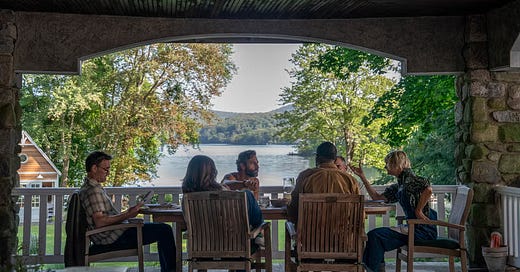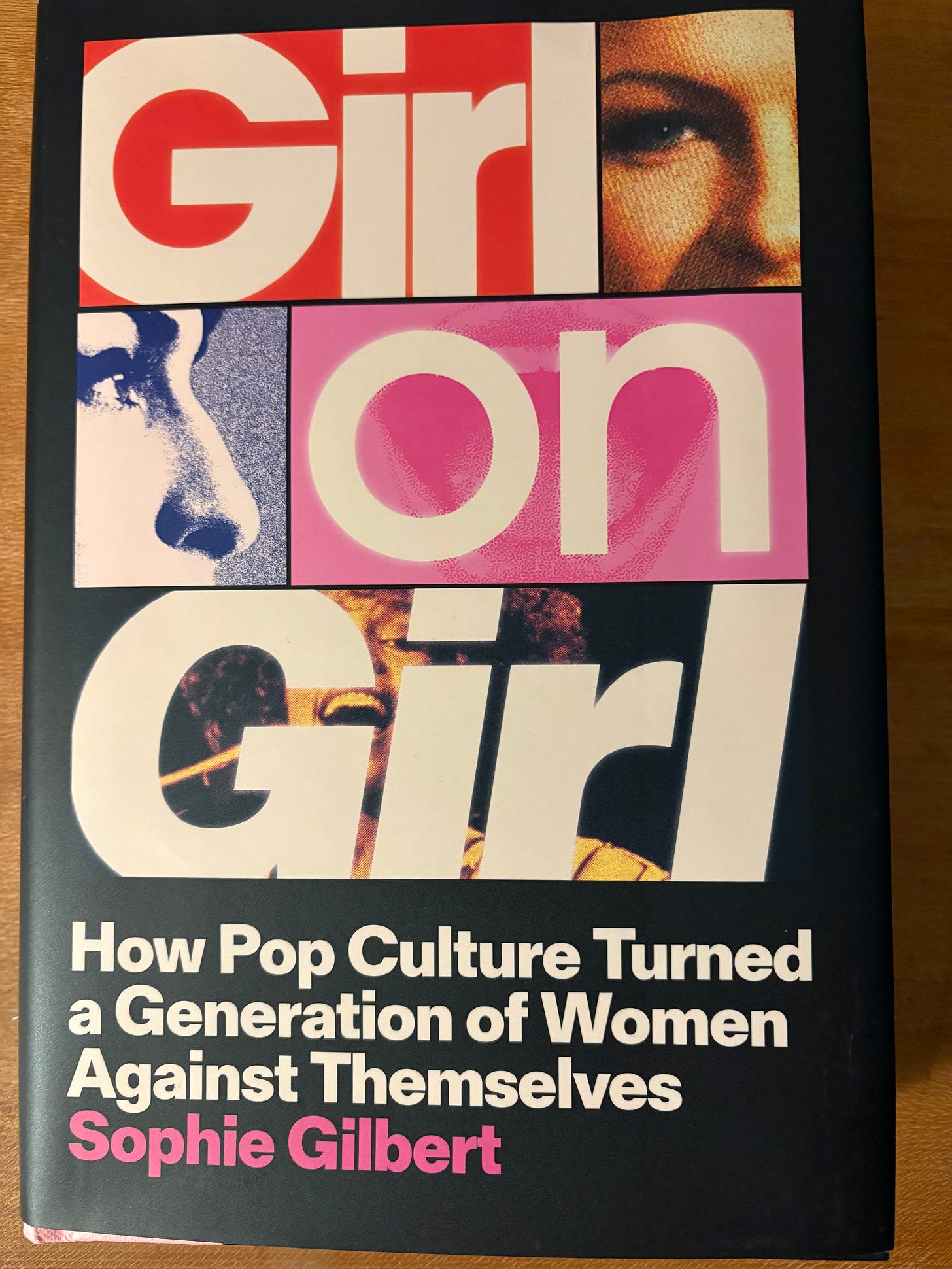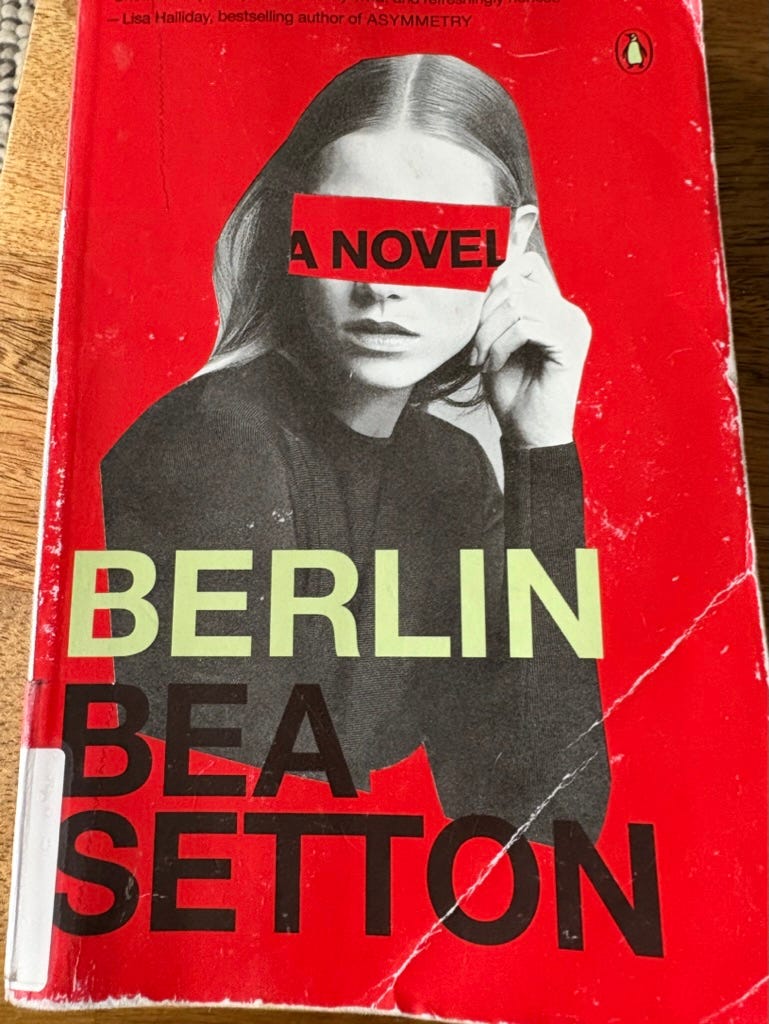I miss TV without rich people. While the focus on the middle class in TV has arguably been declining since the turn of the century, with the family sitcom (The Wonder Years, Rosanne, Married with Children, so many others) replaced by more cinematic, anti-hero dramas, there were still big-ticket shows representing everyday life and the financial struggles inherent (The Office, Six Feet Under, Friday Night Lights, to name a few). Then, in the 2010s, TV had a hey-day of realism with shows like Girls, Insecure, Ramy, Broad City, SMILF, and so many others zeroing in on people’s everyday lives and struggles. It was great!
But these days, it seems, television has hit a point where every new show is set amidst the extremely financially comfortable. And I’m not just talking about White Lotus and Succession, both of which are very pointed social commentaries on extravagant wealth. I’m talking about all the other new shows, which are not necessarily supposed to be about wealth, but are nevertheless set against a backdrop of riches.
I’ve been noticing the trend for the past year or so, but I was particularly struck watching the excellent new Tina Fey show (the more Tina the better IMO), Four Seasons. This is not a glittery show about Hollywood execs like The Studio, or Basketball execs like Turning Point, both featuring extreme wealth. It is not a show about monied spies like Black Doves, or the vacationing one-percent like Nine Perfect Strangers. No, by the looks of it this was a good old comedy about regular, unhappy middle-aged couples—yay! Finally! And to be clear, I adored this show and hope it goes on forever. But something felt astoundingly off. Why the hell was everyone so stinking and inexplicably rich?
To say nothing of the houses, in one episode they all dropped what had to be around $400 a night on a cute campus Inn for parents weekend. Where, I ask, is the couple who needs to stay at the Best Western thirty-minutes outside of town? Bizarrely, they shoved a money issue into the last episode, but up until that very convenient plot device money was very much not an issue for any of these characters and their four-times-a-year vacation rituals.
Another increasingly popular trend that allows shows to conveniently avoid money struggles while not overtly making every character rich to the point of unbelievability, is to make one single character so wildly wealthy that no one else on the show really has to worry about money. Take for example, Deborah Vance in Hacks, or Chase Dreams (lol that name, this show!) in The Other Two. This is not to say that these aren’t excellent, hilarious shows—RIP The Other Two forever—but it is an interesting distraction tactic. While the less lucky characters are toiling away in envy, “poor” by comparison, none of them really have to confront financial stress because the rich one can always save the day. Even the brilliant Dying For Sex has Jay Duplass hovering in the background, a necessary pillar of financial stability that allows for an emotional masterpiece without having to insert the dystopian chaos of navigating our current healthcare system without a job.
Then there are shows like Shrinking and Nobody Wants This, which are maybe supposed to be about average-ish people? I truly don’t know, because the LA lifestyles, homes, and all around glamor of these characters is anything but normal. And let’s quickly acknowledge the intentionally elevated but still (annoyingly) climbing setup of shows like Your Friends and Neighbors and Fleischman’s In Trouble, entire social circles of unhappy wealthy elite. Even Joe, in the new season of You, our once middle-class sociopath, has now married into an unimaginably rich ecosystem making his life and serial-killer antics that much easier. What’s going on?
It’s not that the lack of middle and working class plot-lines inherently makes a show bad—it doesn’t. But it’s notable that whereas content and conflict around money and day-jobs used to serve as points of audience connection, intimacy, and comedy gold, it’s now mostly avoided by new shows entirely.
Of course, there are exceptions. Somebody, Somewhere was a standout in a million ways and it’s a travesty (and maybe telling) that it got cancelled when it seemed to win over every single person who watched it. Abbot Elementary and The Bear are also standout examples. But overall these are exceptions to the broader trend. Historically, TV was a place to see yourself and everyday life reflected back on a screen. But increasingly, we’re flocking there to escape it.
And one can imagine why. If we watch a show about an average American worker today, we may have to stare into our own dismal realities: that we either dislike our jobs or fear losing them or both, while not making nearly enough to buy a home or start a family. As the wealth disparity continues to rise and the middle class continues to shrink, late-stage capitalism increasingly squeezing people for all their worth, no more chit-chatting at the water cooler, we’ve gotten to a point where reality for most people is quite unpleasant. And executives are betting that we don’t actually want to watch it.
This is compounded by the overall contraction of the television industry. In the past few years TV budgets have decreased significantly. After tech companies “disrupted” the space with streaming in the early tens, flush with ridiculous amounts of VC subsidies, that money is now drying up and everyone is scrambling to figure out how to keep making things work. This means the industry has become much more risk averse. Combine that with the disappearing and declining state of the American middle class, and decisions have to be made—confront the growing misery of the average household or run from it? And since most of the people in charge are looking down from a perch somewhere in the Hollywood Hills, they are choosing to run. And leaving a string of gilded, very mid TV in their wake.
Reality right now, one can imagine, might look like a mother working two jobs with shitty benefits and a side hustle, squished into a small house with a few kids, everyone addicted to screens because our tech overlords have us trapped, maybe one addicted to pharmaceuticals. It feels dark because it is, but it’s also life, replete with heart and humor if you look closely like anything else. But stare at it abstractly, from a distance, it might seem so dire that someone is willing to get their brain severed to forget it half the time. And that’s exactly where the non-rich people’s stories can be found right now: in high-concept, dystopian plots. Is it a coincidence that the closest thing to an office drama we have right now is about people literally severing their brains?
My beef around the lack of everyday middle and working class stories has been percolating for a while but I decided to write about it last week, when I had an actual call with Hollywood producers about my novel, NOTHING SERIOUS. For those who subscribe to this newsletter for writing and publishing insights and updates, I will not forsake you entirely! I was over the moon when I heard that a few producers wanted to meet about my book, and listening to them detail very specifically how much they loved it was possibly the best hour and fifteen minutes of my life. But ultimately they didn’t think it could get green-lit as a series by the people in charge.
My novel explicitly deals with money. The main character is a first-generation college graduate from a working class family who studied engineering to pay for school, and works at a tech company in order to help her parents financially. She hates her job, but she needs a paycheck—the greatest millennial offense, as I say in the book, not doing what you love. It’s an everyday story, suspenseful and plot-driven, but primarily a character study and social commentary. It would be too hard to get an everyday book like this made into a series right now, they explained. Nicole Kidman would have to be attached, someone added and we all laughed. And hey, I love a Nicole Kidman mini-series—Big Little Lies, Nine Perfect Strangers, The Perfect Couple, The Undoing!—but oddly, or not so oddly at all, they’re all set against the backdrop of extreme wealth.
If I had it my way, money and work would be a sub-plot in everything because it is an unfortunate but essential part of our lives. People like an escape, sure, but lots of us want to see our actual lives reflected again, too. Currently television is merely tip-toeing around our emotional cores. But plunging into the reality of everyday people and the drudgery of real work with real stakes has always made for great TV. Let’s hope some executive somewhere starts to remember that.
Reminder
I’m teaching a workshop and there are a few spots left! From Corporate to Creative Writer is a 4 week workshop designed for professionals who want to get started and / or progress in a creative writing practice, while making meaningful connections along the way. We'll have in-depth discussions about the paths to publication, examine how a professional career and a creative practice can co-exist, and unlock how to make progress and stay accountable in a way that fits with your lifestyle and goals.
Learn more and answer a few short questions if interested!
Recommendations
I’m reading Sophie Gilbert’s GIRL ON GIRL and relate to it so much that it’s almost too overwhelming to finish. I’ll write more about it soon, but here’s a related essay on my own experience coming of age in our regressive, hyper-sexualized culture at the turn of the century.
I loved this novel, BERLIN, and found a lot of similarities between the main character and the main character of NOTHING SERIOUS. It’s also one of the best portrayals of disordered eating and exercise that I’ve read in a novel.








I loved Somebody Somewhere, I really miss that show!
I was just talking with my critique partner about the literary dimension of this discussion. Characters who don't have any financial struggles but are still presented as relatable and middle or even working class seem to be more common. Or maybe I'm just noticing more of them!
I couldn’t agree more. I’m showing my youth but my friends and I noticed this when the show ICarly came out. Early 2000s kids shows were real middle class kids figuring out life. Drake and Josh were two kids that had jobs and had to figure out how to come up with money to do something outlandish, but it had some realism. ICarly had that first tech wave idea that maybe everyone is secretly rich, living in huge apartments, and getting sushi after school. If obviously was tongue in cheek but I can’t think of anything since that will show a kid wearing clothes that their mom grabbed off the rack from Marshall’s.